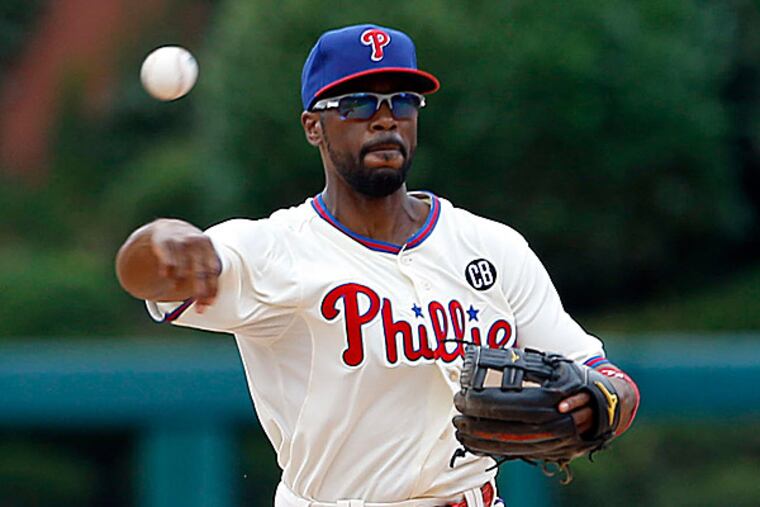Rollins' departure momentous but merciful
Jimmy Rollins leaves as the Phillies all-time offensive leaders, and is spared a painful rebuilding process.

THE FIRST instinct is to call it sad, but there is nothing sadder than what we would have witnessed next year if the players who ushered in the greatest era of Phillies baseball had been forced to endure its worst.
Make no mistake, that's what these next 2 or 3 years will be, and if you wish to argue otherwise by pointing to the 10,000-plus losses that preceded them, well, you've never stepped from the warmth of a well-lit living room into a cold, moonless night.
Yesterday, Jimmy Rollins did what the majority of us would do when he OK'd a trade that will send him back to his home state of California and the hallowed ground of Chavez Ravine (hallowed, that is, unless you happened to live there before Dodger Stadium was built). As of late last night, the deal was still unofficial, and the return was still unknown, and the general manager was still pleading ignorance, except to say that he had called his shortstop to say that reports of its consummation were premature. But it seems clear that, for the first time since before the Sept. 11 attacks, the Phillies will enter a season with somebody other than Rollins as their everyday shortstop.
The only thing that's left for the fan base is to hope that Rollins will soon be followed by his longtime doubleplay partner, not only because he could command a significant return in young talent, but because Galvis-to-Utley-to-Howard just doesn't sound right. In fact, it is worth noting that the Dodgers might have an opening for a second baseman after trading away Dee Gordon yesterday. And, hey, they are always rumored to be in the market for starting pitching.
That would be something, wouldn't it? Three of the most important components of back-to-back NLCS victories finishing their careers with the team that they defeated to advance to both of their World Series? A lot of dominoes would have to fall to make it happen, and it might hurt to envision it, but it would certainly provide the city of Philadelphia with a baseball team worth the price of its attention.
Even if Rollins is the only Phillie to end up in LA - which, it should be stressed, the odds say will be the case - the thought of Opening Day arriving with him wearing Dodger Blue is an astounding one to entertain. He'd be leaving Philadelphia as the franchise's modern-era leader in hits (2,306), doubles (479), and steals (453), with only Mike Schmidt leading his 1,325 runs and 2,306 plate appearances. He is ninth in home runs (216), fifth in RBI (887), second in triples (111).
Rollins is also the franchise's all-time leader in headlines, and whenever it is that the Phillies retire his number 11, it will be his presence that we remember most. At times, he was a polarizing figure, but this city's greatest athletes always are. From the moment the Phillies called him up for good in 2000, Rollins injected the franchise with the quality it needed most: swagger. After seven straight losing seasons, the Phillies would finish with a winning record in 10 of their next 11, culminating in that glorious run from 2007-11 that featured five straight NL East titles, two World Series and one parade down Broad Street.
It takes a great athlete and an even greater personality to survive 15 years in a city that lives and dies with its sports teams. Looking back, there were times when, as a country, it seemed we could barely stand each other for that long. From Clinton to Bush to Obama, from Manhattan to Washington to Shanksville, from Iraq to Afghanistan to Iraq again, from the dot-com bubble to the housing bubble to whatever it is we are living in now, Rollins at shortstop for the Phillies was a constant.
Now, change is the only constant. We said earlier that the only hope is that Rollins marks the start of it. But the fan base also must hope that the men doing the changing are the right ones for the job, that 5 years from now the departures of Rollins and whoever else follows him will prove to have been the necessary first steps on the road to rebirth. That the team acquiring Rollins spent the first month of its offseason rebuilding its front office is worth noting. The Dodgers opted for radical change. The Phillies stood pat. Five years from now we will look back on today as the first in a long line of referendums on those philosophies.
In the meantime, we have a Rollins-less Philadelphia and a Philadelphia-less Rollins. We part as friends, more wistful than sad. Three years ago, when Rollins considered leaving the organization as a free agent, he reflected on his eventual legacy.
"Was I a winner? You can say that," he said. "Was I an impactful player? You can say that. Did I change baseball in the city? You can say that. So the rest is whatever you want to argue about. You can argue this guy was better because he hit better. You can say, well, this guy had a better arm. That's the fun part. But the important things, what I just named, I did."